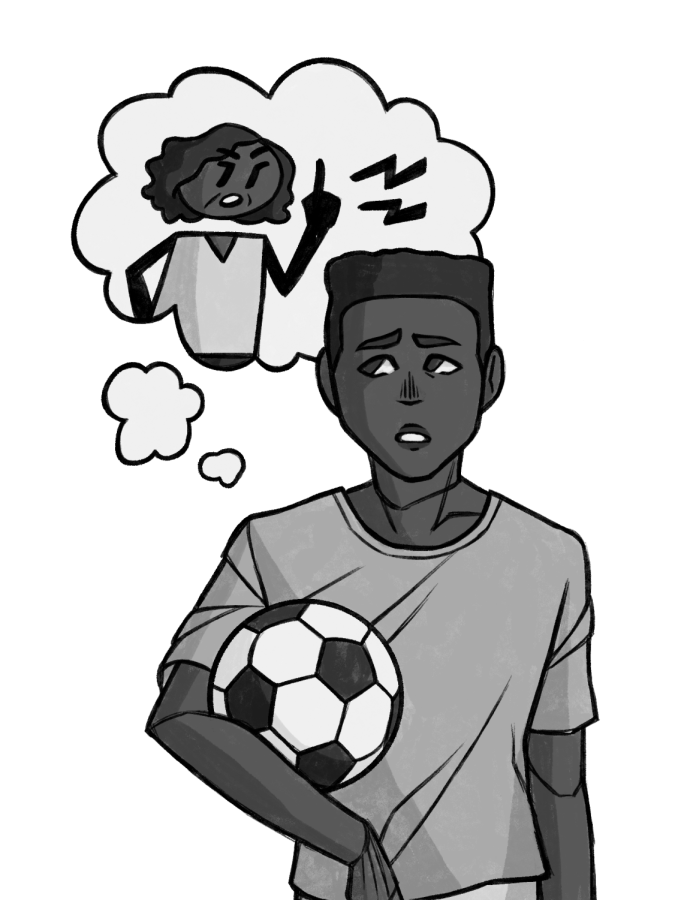SPORTS: Athletes appreciate their support systems
For many high school athletes, their teammates, coaches and parents often influence their relationship with their sport, whether on or off the field. Various Bruins feel pressure to perform at a certain athletic level or achieve certain titles, often diminishing the student’s enthusiasm for participating, and feel that such external pressure has impacted their connection with their team and sport.
Varsity wrestler senior Jade Bracamonte reflected on her experience with parental support and their reassurance from the sidelines during a wrestling match, and noted that such support positively impacts her mental state and athletic performance.
“My parents just make sure that I’m okay and that I have positive encouragement towards me because it’s a mental game when you’re wrestling,” Bracamonte said. “My dad just gives me this look that tells me, ‘You’re gonna do fine. You’re gonna do good. You’re fine,’ right before I’m about to wrestle.”
Bracamonte found that her attention is best spent focusing on her match rather than the nerves that come from an audience watching. She advised that other athletes should share a similar mindset regardless of the sport they play.
“Ignore it and get your nerves out of the way because your nerves can play a huge part in how you perform in your sport, game or match,” Bracamonte said. “You definitely have to ignore the nerves aspect and kind of just let your brain do what it’s doing and just go through the match as you normally would.”
Track and field and cross country member sophomore Dominic McMahon considered his experiences in the past as a gymnast and suggested others should prioritize their well-being and true passion over external pressure.
“I felt pressure, so I stopped liking it. I felt that I had to keep doing it,” McMahon said. “You don’t have to feel pressured to continue doing something you don’t want to.”
Many athletes tend to suffer from long-term effects within their sport, including the unrealistic standards and comparisons that accompany their athletic performance. Varsity softball player and dancer junior Sadie Rios explained why pressure for most athletes stems from the duration they have played the sport and the expectation from others to continue regardless of whether or not their passion remains.
“It’s college, it’s your future and your whole life has revolved around this one sport,” Rios said. “Pressure can be huge – negative and beneficial pressure – because it’s, ‘Wow, these people have these high expectations for me. What if I don’t meet those? Do I let everyone down? That person is coming to my game today. What if I mess up? Are they going to think I’m any different?’”
In addition to athletes feeling the pressures of their season, JV girls soccer coach Khanh Pham has witnessed accounts of discouragement from the sidelines and bleachers throughout games but emphasized the value in private post-game reflections with the team.
“The parents don’t understand the pressure of being on the field, so they might blurt something out that really doesn’t make sense. I know that it affects the girls, so I always have to have a closing meeting with the girls,” Pham said. “Part of that closing is, ‘You got to disregard the pressures of the spectators and just enjoy the game. Play the game.’”
Similar to Pham, Rios found motivation to continue practicing daily from the support of both her dance and softball teammates.
“My friends will also say, ‘You got this,’ and if I didn’t have that ‘You got this,’ I would not have motivation to go out to the field every day or go to the dance room every day,” Rios said.
Senior Will Sidford, a member of the varsity boys water polo and swim teams, recommended those who encourage student-athletes to show their support by making a presence at events while not putting too much stress on the athlete.
“(Fans should) attend the sport and go to all the practices and go to all the games or the meets but (should) not (apply) too much pressure necessarily to be super good or the best,” Sidford said.
Despite the various advantages of athletes’ support systems, some prefer to establish a more independent relationship with their sport. Track and field and cross country runner junior Addison Deboe expressed that relying on herself rather than the support of others often motivates her to establish her own improvement and success.
“It makes you want to get better on your own,” Deboe said. “It’s good to have support, but I think also having someone with a stricter support system kind of draws you away from it (one’s sport) because you’re forced to get better,” Deboe said.
Pham reflected on his responsibility for his athletes’ mental health and athletic passion. He stressed the importance for those on the sidelines and in the stands to channel more support and positivity for the sake of creating a safe environment for athletes to express their emotions and perform well.
“I think that the coach has to be very approachable. Whether it be from parents or from the players, they have to be able to discuss what it is because they (athletes) are young kids,” Pham said. “They (athletes) should be able to express how they’re feeling or what they’re feeling and what their needs are.”
Rios expressed the value of independently uplifting one’s own self throughout the season and beyond.
“You’re the only one that can motivate yourself. You’re the only one that can push you,” Rios said. “Set your own goals for yourself. I feel like that’d be more beneficial than getting thousands of words from a bunch of different people who aren’t yourself and who don’t really benefit off your scholarship or your academic performance.”
Rios said athletes need to prioritize their relationship with their sport over external influences, challenges or remarks.
“Don’t think about it (negative remarks) too much. It’s your life. It’s not your dad’s life. It’s not your mom’s life. It’s not your friend’s life. It’s not your coach’s life. It’s your life,” Rios said.








